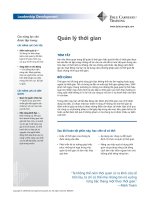Quản lý thời gian
Bạn đang xem bản rút gọn của tài liệu. Xem và tải ngay bản đầy đủ của tài liệu tại đây (4.04 MB, 76 trang )
Time Management
Time management is paying attention to how you are spending your most
valuable resource (time) and devising a plan to use it more effectively.
Goals for Today’s
Lesson:
• Assess/examine how you are
currently allocating your time
• Understand the importance of
managing your time
• Understand different strategies on
how to use your time efficiently
Goal Setting
• In order to know what you should be doing with your
time, it is important to know what you are working
towards
• Long term goals = Life-long goals (usually take a year or
more to accomplish)
• Short-term goals = Stepping stones (less than a year to
accomplish)
Goal Setting,
Give it a shot!
• Write a short-term and long-term goal
• Your short-term goal should be a ‘stepping stone’
on the path to achieving your long-term goal
• Make sure both goals are:
– Specific
– Measurable
• Volunteers?
Where does the time go???
• Make a list of 10-15 observable activities
you have participated in during the past
24 hours.
• Estimate how much time you spent on
each activity.
It is all connected- Goal
Setting & Time Management
• If your goal is to increase your GPA you will need to
be well organized to allocate sufficient time for
study or visit your professors office hours
• Knowing ahead of time what your main priorities are
can help you attend to those tasks first
• Are you allocating the necessary time in achieving
the short-term and long-term goals you set earlier?
Why is Time Management
Important?
•
•
•
•
•
•
•
•
•
Prioritize your tasks
Accomplish short-term and long-term goals
Increases productivity
Experience the success of accomplishment (fulfillment)
Feeling of self-control
Balance
Aids in money management
Reduces stress
Prepares you for the “real world”
Consider your Values
• You will put more time and energy towards what
you value, enjoy and love.
• How much do you value your education?
• How important is it that you succeed in college
and get your degree?
• If success in college is a high value for your life,
you will make more time for your studies, your
classes and projects.
• We all spend time on what we value!
What is Time Management?
• Not just about managing your time,
it’s about managing your attention
• Attention Management = ability to
focus on a designated activity
• Without attention management,
time management is pointless
“To manage your time you must manage
yourself: your energy, your behavior, your
attitudes, you”--- Constance Staley
Get Your Priorities Straight!
Covey, Stephen R. The Seven Habits of Highly Effective
People. New York: Simon and Schuster, 1989.
Which Quadrant Are You In?
• Go back to your list of Observable
Activities:
– Write each activity into the appropriate
Quadrant on your graph.
– Using the time estimates you wrote for each
activity, circle the Quadrant in which you spent
the most time (you may have a tie!).
Priorities Are Personal
• Sleep may be Quadrant IV for one person and
Quadrant I for another.
• In which Quadrant did you spend the majority of
your time?
• Which quadrant is the best? (for studying?)
• What happens if you spend the majority of your time
in Quadrant I activities?
Performance, health & happiness are grounded in
the skillful management of energy” Jim Loehr and Tony
Schwartz, from the Power of Full Engagement
How to use time wisely
•
•
Electronic or hard copy day planner or calendar
Schedule Fixed Blocks of Time First
– Start with class time, work schedule, child
care
•
•
•
•
Schedule DO & DUE dates
Work Backwards
Use syllabus!
Schedule study time every day--- at least 2
hours (if you have breaks between your
classes, use it!)
–
Some classes require more study time than others
–
10 minute study breaks after studying for 1 hour
How to use time wisely
Hours you should be spending studying:
Units for less demanding classes:____ x 2 hours=___ hours
Units for typical/average classes:__ X 3 hours = ___ hours
Units for typical/average classes:__ X 4 hours = ___ hours
Expected total study time per week: ____ hours
How to use time wisely
•
Set aside time for the day to day tasks that
will bring you a step closer to reaching your
goals
•
Update your schedule everyday
•
Break larger assignments into smaller tasks
(exp: final term papers)
•
Avoid scheduling marathon study sessions
–
Three 3-hour sessions are more productive than 910 hour sessions
How to use time wisely
•
Schedule time to study for tests and to review
notes (set a regular place to study & a
specific subject)
•
Schedule time for errands
•
Plan for the unplanned
•
Double your time estimates (tasks can take
longer than expected)
•
Take time for you! Don’t forget yourself and
your needs (sleeping, nutrition, exercise)
How to use time wisely
•
Set priorities
•
Be realistic
•
Allow for flexibility in your schedule
•
Schedule time for fun!
•
The final step is to act on the schedule you
wrote down
• When you say “I don’t have time, what
you are really saying is “I have other
priorities.”






